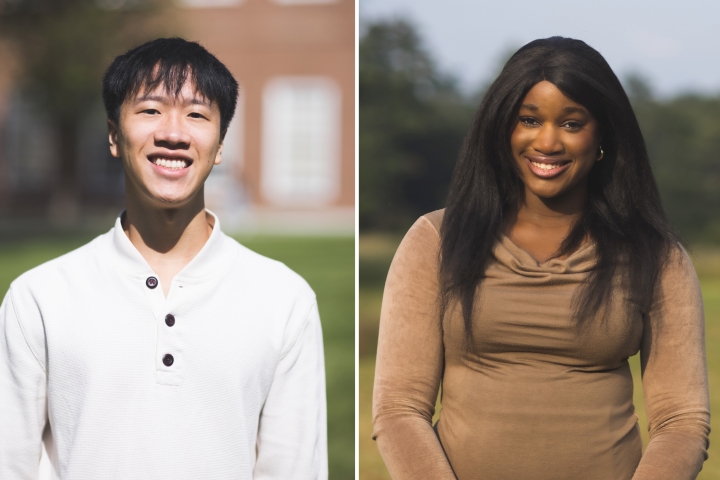Kenny Mok ’25 and Onyinyechi Owo ’25 have been awarded Obama-Chesky Voyager Scholarships for Public Service.
Founded by former President Barack Obama, Michelle Obama, and Brian Chesky, the co-founder and CEO of Airbnb, the Obama Foundation program works to create leaders who can bridge divides to help solve the world’s biggest challenges. Among the qualifications are a passion for helping others, service or community-building experience, and a commitment to public service.
Voyagers receive up to $50,000 toward college expenses and $10,000 and housing for a self-designed work-travel experience, or “summer voyage.” They also have access to a network of mentors and other support as they define their public service journeys.
The scholarship celebrates the history of public service embodied by the Obamas, says Christie Harner, assistant dean of faculty for fellowship advising.
“To have two incredible Dartmouth winners this year, in only the second year of the scholarship, is a true testimony to the community work happening on campus and through our students,” Harner says. “I’m thrilled to have these students’ commitment to public service alongside academic success recognized in this prestigious way.”
Focus on the energy transition
Mok, who focuses on energy justice and the transition to renewable energy, says he is excited to see where his travels as a Voyager scholar will take him, and how he can effect change through public service.

“I think this will have a very large impact on my life,” says Mok, who is from San Juan, Puerto Rico, and attended high school in Brooklyn, N.Y.
The subject of energy inequality strikes close to home for him.
In Puerto Rico, the privatization of the energy grid is driving up electricity costs, and tax incentives provided by the government have prompted an influx of wealthy individuals to the island, leading to increased inequality and gentrification, says Mok, who studies history modified with Latin American studies, with a minor in environmental studies.
At Dartmouth, participating in TuckLAB, “an amazing crash course” on energy and geopolitics, inspired him toward a career in an environmental or energy sector.
And classes with Christopher Sneddon, professor of geography and environmental studies, and Melody Brown Burkins, director of the Institute of Arctic Studies, have been “gateways” into understanding possible real-world solutions, he says.
Mok’s Summer Voyage will likely take him to Europe, where in 2022, more than 61,000 people died from heat-related illness.
As climate change unfolds, he wants to see what innovations and technology there will be “to fight against these massive heat spikes and help those who are most vulnerable.”
Palliative care in underserved communities
Owo, who is majoring in history and neuroscience, with a minor in global health, expects her summer experience to involve terminally ill patients in underserved communities.

“A lot of areas don’t have good palliative care services, or any support at all for people who are dying,” says Owo, who has volunteered with patients receiving end-of-life services. Working to create sustainable care in such areas “is one of my main goals.”
Owo is a member of the Pre-Health Peer Mentor Corps and recently helped revitalize the Dartmouth chapter of the Minority Association of Pre-Health Students, which will volunteer with the Walk to End Alzheimer’s-Upper Valley, VT/NH, in Hanover on Sept. 30.
Owo was born in Texas, and she and her family moved often, most recently to Ontario, Canada. Seeing firsthand the disparities in health care services in several countries, including Nigeria, where she has relatives, sparked her interest in public service.
And faith in God, she says, has given her a deeper level of awareness and empathy, which also has shaped her path.
“When I see someone who’s really going through something, I feel like I’m in their shoes,” she says. “I’m trying to figure out the best way to help people who grew up in hard conditions around the world.”
